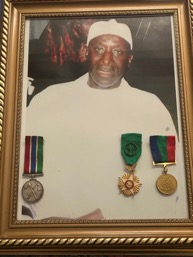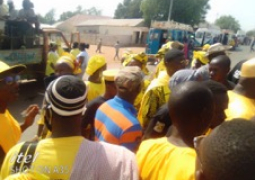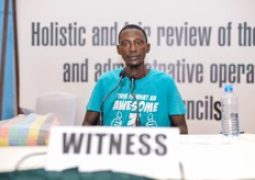
On 26th September 2002, a Senegalese ship Le Joola sank in Gambian waters while traveling to Cassamance. That incident has been regarded as the worst capsize in the sub-region. It claimed about 1800 lives.
However, a Gambian fishing vessel called Deego 2 rescued 27 people. This let Senegal’s Government decorate Mr. Njie, Colonel Babucarr Jatta, and other government officials.
Speaking to The Point exclusively, Mr. Njie said: “20 years ago on a Thursday morning. I went to the Pipeline Mosque to perform my fajir prayer. When I left the house, the captain of my vessel called me and my wife received the call but told him I had gone to the mosque. He told my wife that there was a serious accident in the sea and as the owner of the vessel they needed my command to rescue the passengers in the Senegalese vessel.
“When he (the captain) called for the second time, I was at the house and I ordered them to rescue the passengers.”
The businessman said he ordered his men to rescue the passengers on humanitarian grounds, noting that The Gambia and Senegal are two countries of one people.
“When former President Wadda came to The Gambia and Ex- Senegalese Ambassador to The Gambia told him this is the man who rescued our people. He (Wadda) said: ‘If you incurred any cost the Senegalese Government will refund it and I told him I have incurred cost but I do not need any refund from Senegal,” he said.
Asked why he failed to take financial compensation from Senegal, he said: “The Gambia and Senegal are one and the Senegalese Government can in turn help The Gambia. “And they (Senegalese) did that when former President Jammeh refused to step down in 2016. I did not predict that will happen before but it happened,” he said.
However, Njie recalled that upon arrival of his vessel with the survivors on the sea shore, former President Jammeh immediately instructed his Health minister to identify a special ward for the survivors at the country’s main referral hospital, while (he) Jammeh bought clothes for them too.
“There was a French man who was trying to help a pregnant lady whom he thought was his wife but unfortunately his wife could not make it. She died in the sea,” he recounted.
On Senegal’s response to his arrest, he said: “In 2012, I was detained by former President Jammeh and when the Senegalese Government heard over the media that the man who helped Senegal rescue 27 people had been detained by Jammeh. Immediately on a Friday prayer, it was part of the sermon of the imams within Dakar. And then the following Sunday, the Christians were informed to pray for me. This was a return of gratitude for what I had done for them.”
Njie said he was amazed because even his country could not do such for him, adding: “If I have taken the money that former President Wadda offered me, they would have not done that for me. So, money is not everything and The Gambia and Senegal are one.”
He said a humanitarian service is something that every person has to do, noting the life you save could be yours. “Good gestures are necessary for all of us to practise,” he said.



